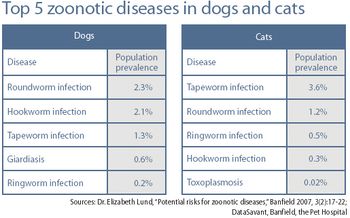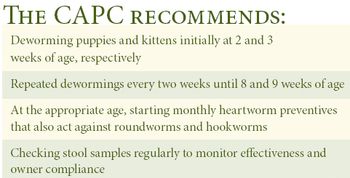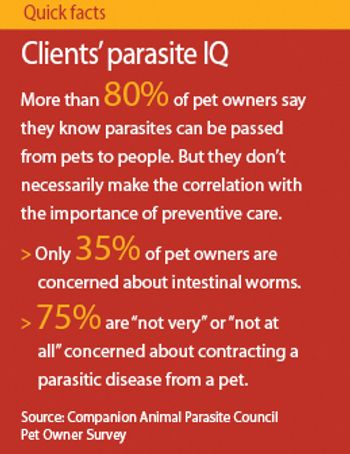
How to diagnose and control sarcoptic mange, demodicosis, Cheyletiellosis, Otodectic mange, and more.

How to diagnose and control sarcoptic mange, demodicosis, Cheyletiellosis, Otodectic mange, and more.

Experimental studies conducted at Auburn University have shown that an acute respiratory crisis often diagnosed as asthma may occur during either Stage (Phase) 1 or 2 feline heartworm disease.

Trying to manage client expectations concerning performance attributes of flea control products and gaining and understanding of Integrated Flea Control requires: (1) an improvement in the clinicians investigation skills and understanding of difficult flea challenges, (2) that we gain an understanding of the biologic and epidemiologic factors responsible for persistent flea infestations, (3) that we achieve a better understanding of the client factors responsible for persistent flea infestations and (4) that we learn how to better manage client expectations of modern flea control products.

To ensure the health and well-being of pet dogs and cats, coprologic examinations for parasite eggs, oocysts, and cysts are an important part of the daily routine for most veterinary practices.

Preventive health care, including the prevention of common parasitic infections in cats and dogs, is an approach that is relatively easy to accomplish.

Various serovars of Leptospira interrogans are the infective agents.

Parasites are a common finding in wild-caught and captive small exotic mammals.

To reduce the risk for pets and people, the new thinking should be, "We're all in this together."

Columbus, Ohio - A new study conducted by The Ohio State University College of Veterinary Medicine suggests that pigs raised without antibiotics were more susceptible to parasitic infections and disease.

Austin, Texas - A year after establishing its first 39,325-acre quarantine to fight fever ticks, the Texas Animal Health Commission (TAHC) has expanded its watch zone by another 307,000 acres.

'Tis the season for creepy crawlies to worm their way into clients' and pets' lives. Remind clients of these disease prevention tips.

West LaFayette, Ind. - Following an aggressive deworming schedule for dogs and cats could have a significant impact on the zoonotic transmission of parasitic diseases, according to one expert.

Q: Please provide a review on canine babesiosis and canine leptospirosis.

San Antonio, Texas - The American Heartworm Society intends to survey more than 40,000 veterinary clinics and hospitals this summer to record the number of dogs diagnosed and treated for heartworm disease as part of the group's three-year plan to increase awareness heartworm awareness.

American Heartworm Society will survey more than 40,000 veterinary clinics this summer.

Heartworms and intestinal parasites, such as roundworms, hookworms, and tapeworms, can cause serious infection-and death-in dogs and pose a zoonotic threat to people. By following a few simple guidelines, you can empower clients to prevent and control these parasitic infections in their dogs.

The political candidates aren't the only ones taking their messages to the people this summer. The Companion Animal Parasite Council (CAPC) is also hitting the road immediately after the AVMA Annual Convention in New Orleans in an effort to spread the word about the importance of year-round parasite control in dogs and cats.

Dr. Stephen C. Barr examines this parasitic disease and its public health concerns.

Dr. Melisa Hicks and her team at Blue Cross Veterinary Hospital in Long Beach, Calif., improve compliance by encouraging clients to prepay for fecal tests.

Of all the diagnostic techniques used to detect gastrointestinal parasites, none is more accurate and reliable than centrifugal fecal flotation when it is performed properly.

Educate clients about the health risks parasites pose with this client education handout.

Tapeworm infection is often overlooked, underdiagnosed, and indertreated in dogs and cats throughout the Unites States. To reverse this trend, it's imperative that veterinarians and their team members understand and thoroughly educate clinets about the risk of tapeworm zoonoses and the importance of prevention.

The adult cat flea (Ctenocephalides felis) is a ubiquitous, enterprising and persevering insect. The cat flea is the most dominant, competitive and most common flea associated with domesticated animals today.

Pets presented for complaints associated with some pathology of their skin - such as pruritis, abnormalities of keratinization, alopecia and other abnormalities both primary and secondary - comprise a large percentage of cases seen by veterinarians.

Biannual deworming protects patients and encourages regular wellness visits.